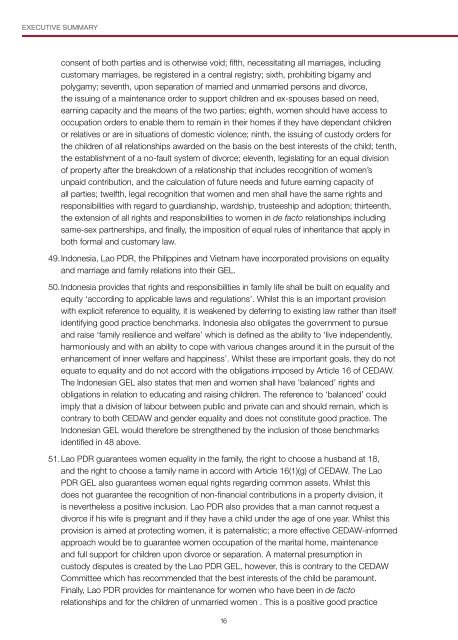Gender Equality Laws - CEDAW Southeast Asia
Gender Equality Laws - CEDAW Southeast Asia
Gender Equality Laws - CEDAW Southeast Asia
You also want an ePaper? Increase the reach of your titles
YUMPU automatically turns print PDFs into web optimized ePapers that Google loves.
EXECUTIVE SUMMARYconsent of both parties and is otherwise void; fifth, necessitating all marriages, includingcustomary marriages, be registered in a central registry; sixth, prohibiting bigamy andpolygamy; seventh, upon separation of married and unmarried persons and divorce,the issuing of a maintenance order to support children and ex-spouses based on need,earning capacity and the means of the two parties; eighth, women should have access tooccupation orders to enable them to remain in their homes if they have dependant childrenor relatives or are in situations of domestic violence; ninth, the issuing of custody orders forthe children of all relationships awarded on the basis on the best interests of the child; tenth,the establishment of a no-fault system of divorce; eleventh, legislating for an equal divisionof property after the breakdown of a relationship that includes recognition of women’sunpaid contribution, and the calculation of future needs and future earning capacity ofall parties; twelfth, legal recognition that women and men shall have the same rights andresponsibilities with regard to guardianship, wardship, trusteeship and adoption; thirteenth,the extension of all rights and responsibilities to women in de facto relationships includingsame-sex partnerships, and finally, the imposition of equal rules of inheritance that apply inboth formal and customary law.49. Indonesia, Lao PDR, the Philippines and Vietnam have incorporated provisions on equalityand marriage and family relations into their GEL.50. Indonesia provides that rights and responsibilities in family life shall be built on equality andequity ‘according to applicable laws and regulations’. Whilst this is an important provisionwith explicit reference to equality, it is weakened by deferring to existing law rather than itselfidentifying good practice benchmarks. Indonesia also obligates the government to pursueand raise ‘family resilience and welfare’ which is defined as the ability to ‘live independently,harmoniously and with an ability to cope with various changes around it in the pursuit of theenhancement of inner welfare and happiness’. Whilst these are important goals, they do notequate to equality and do not accord with the obligations imposed by Article 16 of <strong>CEDAW</strong>.The Indonesian GEL also states that men and women shall have ‘balanced’ rights andobligations in relation to educating and raising children. The reference to ‘balanced’ couldimply that a division of labour between public and private can and should remain, which iscontrary to both <strong>CEDAW</strong> and gender equality and does not constitute good practice. TheIndonesian GEL would therefore be strengthened by the inclusion of those benchmarksidentified in 48 above.51. Lao PDR guarantees women equality in the family, the right to choose a husband at 18,and the right to choose a family name in accord with Article 16(1)(g) of <strong>CEDAW</strong>. The LaoPDR GEL also guarantees women equal rights regarding common assets. Whilst thisdoes not guarantee the recognition of non-financial contributions in a property division, itis nevertheless a positive inclusion. Lao PDR also provides that a man cannot request adivorce if his wife is pregnant and if they have a child under the age of one year. Whilst thisprovision is aimed at protecting women, it is paternalistic; a more effective <strong>CEDAW</strong>-informedapproach would be to guarantee women occupation of the marital home, maintenanceand full support for children upon divorce or separation. A maternal presumption incustody disputes is created by the Lao PDR GEL, however, this is contrary to the <strong>CEDAW</strong>Committee which has recommended that the best interests of the child be paramount.Finally, Lao PDR provides for maintenance for women who have been in de factorelationships and for the children of unmarried women . This is a positive good practice16
















